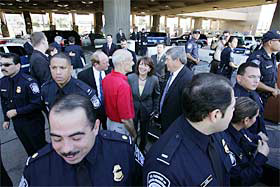 |
 |
 |
 News from Around the Americas | January 2006 News from Around the Americas | January 2006  
Chertoff Targets Human Smuggling
 Anna Cearley - Union-Tribune Anna Cearley - Union-Tribune


| | Homeland Security Secretary Michael Chertoff (in red shirt) spoke to Reps. Susan Davis (center) and Duncan Hunter at the San Ysidro port of entry last week. (K.C. Alfred/Union-Tribune) |
Homeland Security Secretary Michael Chertoff announced last week that the agency will beef up efforts to dismantle human smuggling operations through closer collaboration with local police agencies, additional space to hold detainees and more prosecutions.

"It's about detaining them as opposed to releasing them . . . it's about the prosecution of people involved in human smuggling, about taking their assets, about sending them to jail," he said at the San Ysidro port of entry.

Chertoff, who made a one-day swing through San Diego in support of the Bush administration's plan to curb illegal immigration, called the effort a way "to get control of the border."

He also defended the decision to change the way the federal government assesses the terror threat to cities, a change that could affect the amount of anti-terrorism money San Diego receives.

Michael Unzueta, special agent in charge of U.S. Immigration and Custom Enforcement's San Diego office, said later that the initiative addresses issues of terrorism and of traditional smuggling networks.

"One day that organization may be smuggling people from Mexico, but what's to say that given the right amount of money that they don't smuggle someone the following day from a country that would pose a threat," he said.

No budget estimate was available for the program, and Chertoff didn't provide details, such as how many more beds would be provided for detainees or how prosecutors could manage more smuggling cases without more resources.

He said the program will start at the San Ysidro and Otay Mesa ports of entry, and that attention will be continuously shifting to other border areas.

The initiative will include more law enforcement along the border, more intelligence-sharing with other agencies, and more technology and dogs to sniff out people hidden inside vehicles, he said.

Chertoff said his agency will also work closely with the U.S. Attorney's Office to encourage tougher sentences for smugglers and to seize smugglers' assets.

Debra Hartman, spokeswoman with the U.S. Attorney's Office in San Diego, said Chertoff met with U.S. Attorney Carol Lam yesterday, but Hartman did not say how the program would be implemented in the courts.

One of the goals of the overall Bush administration plan is to eliminate the "catch and release" of non-Mexican illegal immigrants.

Lacking bed space to hold those immigrants until they can be returned to their home countries, federal agents must often release them with a notice to appear in court. Most never do, and instead melt into U.S. communities.

In November, administration officials said 2,000 beds would be added to the existing 18,000 beds for such detainees nationwide.

In fiscal 2005, however, about 155,000 illegal crossers from countries other than Mexico were caught.

Shawn Moran, vice president of the National Border Patrol Council Local 1613 in San Diego, said the program Chertoff described would require more prosecutors and judges.

"Talk is cheap and you hear a lot of things about how they are going to get tougher on the border," he said. "When you have very broad goals with no details as to how to accomplish them, then no one can hold you accountable."

Chertoff's announcement came less than a week after a Mexican man was shot and killed by a U.S. Border Patrol agent near the San Ysidro port of entry.

Border Patrol officials said the agent shot in self-defense after a man started throwing rocks at him.

This week, a U.S. border official told The Associated Press the victim had been detained 11 times for smuggling people.

Chertoff avoided commenting directly on the case, but said the emphasis on smuggling operations comes as Border Patrol agents are under increasing attack from aggressive smuggling groups.

Though the emphasis of Chertoff's visit was on smuggling, he was questioned throughout his San Diego visit about a recent change in the distribution of funds for cities deemed at highest risk of a terrorist attack.

In a letter to Chertoff, San Diego Mayor Jerry Sanders explained why San Diego should be among the "high risk" cities eligible for millions of dollars in federal aid.

The city stands to lose about $14 million a year, money used to improve emergency communications, buy equipment and staff programs.

Sanders said in a news conference last week that Chertoff promised to review his request to reconsider San Diego's status. A similar pitch will be made in Washington, with the backing of Gov. Arnold Schwarzenegger and other California lawmakers, Sanders said.

"We're going to fight . . . I think we've got a good chance," the mayor said.

In a meeting with the editorial board of The San Diego Union-Tribune, Chertoff defended his decision, saying that even though the region has potential terrorist targets, it is considered less vulnerable than other urban areas.

For example, he said, the military bases could be a target, but they also can be considered assets.

"It's unlikely terrorists are going to overcome the 1st Marine Division and get into the naval base," Chertoff told the editorial board.

At the port of entry, Chertoff said that some cities, such as San Diego, may qualify for other grants related to security. He said initiatives such as the one announced last week prove the federal government's commitment to homeland security.

"I think that when you look at the whole menu, the whole package, what you see is that we are in fact taking very seriously the challenges that are presented in this area," he said.

Staff writers Kelly Thornton and Tony Manolatos contributed to this report. | 
 | |
 |



